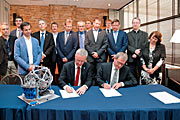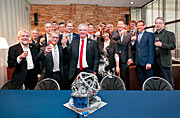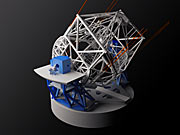Announcement
Agreement Signed for METIS Instrument for E-ELT
28 September 2015
ESO has signed an agreement with a consortium of institutes around Europe [1] for the design and construction of METIS, an infrared camera and spectrograph for the European Extremely Large Telescope (E-ELT).
The agreement was signed by H. W. (Willem) te Beest, Vice-President Executive Board, Leiden University, on behalf of the consortium, and Tim de Zeeuw, ESO Director General, at a ceremony at the Science Faculty Club of Leiden University in the Netherlands, on 28 September 2015.
Bernhard Brandl, the Principal Investigator of METIS, was also in attendance as well as all Co-Investigators and the project managers of all the partners in the consortium.
METIS is one of the Phase 1 instruments for the E-ELT. It will offer imaging and medium-resolution spectroscopy over a wavelength range from 3–19 micrometres, and high-resolution integral field spectroscopy over a wavelength range of 3–5.3 micrometres. METIS is the only E-ELT Phase 1 instrument to work at these longer mid-infrared wavelengths and complements the MICADO camera and HARMONI spectrograph.
The METIS instrument, in conjunction with the huge light-collecting power and resolution of the E-ELT, will allow many advances in a wide range of astronomical topics. These include the study of protoplanetary discs and the formation of planets, detailed investigations of the properties of exoplanets and, closer to home, the formation and history of the Solar System. METIS will also probe the growth of supermassive black holes as well as study star-forming galaxies in the early Universe.
METIS, like the other E-ELT instruments, builds on development work at ESO and in the community over many years. It is the successor to earlier ESO mid-infrared instruments, including VISIR and CRIRES.
In Greek mythology, Metis was the first wife of Zeus and mother of Athena, goddess of wisdom.
Notes
[1] The consortium consists of the Nederlandse Onderzoekschool Voor Astronomie (NOVA), represented by Leiden University (the Netherlands), the Max-Planck-Gesellschaft, represented by the Max-Planck-Institut für Astronomie (MPIA) (Germany), the UK Astronomy Technology Centre (UKATC) (United Kingdom), the Katholieke Universiteit Leuven (Belgium), CEA Saclay (France), ETH Zürich (Switzerland) and Universität Wien on behalf of the A* consortium (Austria).
Links
- METIS webpage at ESO
- Additional METIS information (Leiden)
- Detailed description of METIS
Contacts
Bernhard Brandl
METIS Principal Investigator
Leiden Observatory
Leiden, the Netherlands
Email: brandl@strw.leidenuniv.nl
Ralf Siebenmorgen
ESO Project Scientist
Garching bei München, Germany
Tel: +49 89 3200 6598
Email: rsiebenm@eso.org
Richard Hook
ESO Public Information Officer
Garching bei München, Germany
Tel: +49 89 3200 6655
Cell: +49 151 1537 3591
Email: rhook@eso.org
Marieke Baan
Nederlandse Onderzoekschool voor Astronomie (NOVA)
NOVA Informatie Centrum, Amsterdam
Tel: +31(0) 20 5257480
Cell: +31(0) 6 14322627
Email: H.M.Baan@uva.nl
About the Announcement
| Id: | ann15073 |
Our use of Cookies
We use cookies that are essential for accessing our websites and using our services. We also use cookies to analyse, measure and improve our websites’ performance, to enable content sharing via social media and to display media content hosted on third-party platforms.
ESO Cookies Policy
The European Organisation for Astronomical Research in the Southern Hemisphere (ESO) is the pre-eminent intergovernmental science and technology organisation in astronomy. It carries out an ambitious programme focused on the design, construction and operation of powerful ground-based observing facilities for astronomy.
This Cookies Policy is intended to provide clarity by outlining the cookies used on the ESO public websites, their functions, the options you have for controlling them, and the ways you can contact us for additional details.
What are cookies?
Cookies are small pieces of data stored on your device by websites you visit. They serve various purposes, such as remembering login credentials and preferences and enhance your browsing experience.
Categories of cookies we use
Essential cookies (always active): These cookies are strictly necessary for the proper functioning of our website. Without these cookies, the website cannot operate correctly, and certain services, such as logging in or accessing secure areas, may not be available; because they are essential for the website’s operation, they cannot be disabled.
Functional Cookies: These cookies enhance your browsing experience by enabling additional features and personalization, such as remembering your preferences and settings. While not strictly necessary for the website to function, they improve usability and convenience; these cookies are only placed if you provide your consent.
Analytics cookies: These cookies collect information about how visitors interact with our website, such as which pages are visited most often and how users navigate the site. This data helps us improve website performance, optimize content, and enhance the user experience; these cookies are only placed if you provide your consent. We use the following analytics cookies.
Matomo Cookies:
This website uses Matomo (formerly Piwik), an open source software which enables the statistical analysis of website visits. Matomo uses cookies (text files) which are saved on your computer and which allow us to analyze how you use our website. The website user information generated by the cookies will only be saved on the servers of our IT Department. We use this information to analyze www.eso.org visits and to prepare reports on website activities. These data will not be disclosed to third parties.
On behalf of ESO, Matomo will use this information for the purpose of evaluating your use of the website, compiling reports on website activity and providing other services relating to website activity and internet usage.
Matomo cookies settings:
Additional Third-party cookies on ESO websites: some of our pages display content from external providers, e.g. YouTube.
Such third-party services are outside of ESO control and may, at any time, change their terms of service, use of cookies, etc.
YouTube: Some videos on the ESO website are embedded from ESO’s official YouTube channel. We have enabled YouTube’s privacy-enhanced mode, meaning that no cookies are set unless the user actively clicks on the video to play it. Additionally, in this mode, YouTube does not store any personally identifiable cookie data for embedded video playbacks. For more details, please refer to YouTube’s embedding videos information page.
Cookies can also be classified based on the following elements.
Regarding the domain, there are:
- First-party cookies, set by the website you are currently visiting. They are stored by the same domain that you are browsing and are used to enhance your experience on that site;
- Third-party cookies, set by a domain other than the one you are currently visiting.
As for their duration, cookies can be:
- Browser-session cookies, which are deleted when the user closes the browser;
- Stored cookies, which stay on the user's device for a predetermined period of time.
How to manage cookies
Cookie settings: You can modify your cookie choices for the ESO webpages at any time by clicking on the link Cookie settings at the bottom of any page.
In your browser: If you wish to delete cookies or instruct your browser to delete or block cookies by default, please visit the help pages of your browser:
Please be aware that if you delete or decline cookies, certain functionalities of our website may be not be available and your browsing experience may be affected.
You can set most browsers to prevent any cookies being placed on your device, but you may then have to manually adjust some preferences every time you visit a site/page. And some services and functionalities may not work properly at all (e.g. profile logging-in, shop check out).
Updates to the ESO Cookies Policy
The ESO Cookies Policy may be subject to future updates, which will be made available on this page.
Additional information
For any queries related to cookies, please contact: pdprATesoDOTorg.
As ESO public webpages are managed by our Department of Communication, your questions will be dealt with the support of the said Department.





